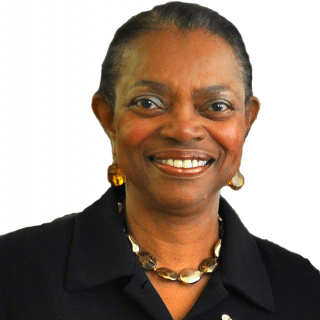At the TWU Local 100 headquarters in Downtown Brooklyn, State Senator Velmanette Montgomery announced her impending retirement from politics on January 11 after a 35-year career in Albany, where she represented neighborhoods such as Red Hook, Gowanus, and Boerum Hill. A former daycare director, Montgomery entered a mostly white, mostly male legislative body – which would remain under continuous Republican control until 2019 – and proved herself an effective advocate for liberal policies, including legislation to raise the age of adult criminal responsibility from 16 to 18, protections against deed theft, and the legalization of needle exchange programs. Many residents of District 25 will miss her.

Unsurprisingly, a who’s-who of local Democratic leaders turned out for Montgomery’s send-off: U.S. Representative Yvette Clark; City Councilmembers Robert Cornegy, Alicka Ampry-Samuel, and Helen Rosenthal; State Assemblymembers Al Taylor and Walter Mosley; State Senator Roxanne Persaud; and retired legislators Annette Robinson and Al Vann. They showed up not only to celebrate Montgomery but also to watch her pass the torch to her hand-picked successor, Assemblymember Tremaine Wright of the 56th District, who will give up her seat in the lower chamber to vie for Montgomery’s spot in the Senate. Assembly District 56 and Senate District 25 overlap in parts of Bedford-Stuyvesant and Crown Heights.
“My consideration to leave this post was indeed with great concern that the work that we have all put into building this district over the decades be preserved and continued,” Montgomery said. “So, thankfully, I have met a colleague who has approached me to say that she will run, and I am very happy because she embodies the principles and the standards of leadership and many of the experiences that are similar to mine.”
Even more pols showed up at TWU Local 100 to endorse Wright on that Saturday afternoon. Gowanus’s assemblywoman, Jo Anne Simon, called Wright “a forceful leader” and “a delight to work with at all times.” Diana Richardson, who represents Prospect Lefferts Gardens in the Assembly, pledged to knock doors for the upcoming campaign and urged attendees to “cut a check” for Wright, who has “always elevated her voice for the power of the people.”
Most of the speeches seemed to regard Wright’s expected promotion as a foregone conclusion. “I know she’s going to be great in the Senate,” promised another Assembly colleague, East Flatbush’s N. Nick Perry. “Tremaine, I’m going to miss you,” gushed assemblywoman Latrice Walker from Brownsville.
Senators Kevin Parker (East Flatbush) and John Liu (College Point) were ready to welcome Wright into the upper chamber. “I always say that Tremaine has the three C’s: she is competent, she’s confident, and she also has the commitment that the people of Brooklyn need and deserve,” Parker rhapsodized. “Tremaine, I know you’re going to do all of us proud,” Liu predicted.
What about housing?

Wright has served in the Assembly only since 2017, and her district extends no farther west than Nostrand Avenue, so voters in Red Hook – which Wright hopes to represent starting in 2021 – may not yet know her well. As a reporter, however, I frequently heard her name last summer while researching a story about the exclusion of Senator Julia Salazar’s ambitious Good Cause Eviction bill from the Housing Stability and Tenant Protection Act of 2019 (HSTPA), which Governor Cuomo signed into law on June 14.
The omnibus legislation, which reformed New York’s rent laws to benefit tenants (for whom it marked a major victory), incorporated – in some form – eight of nine preexisting bills promoted by housing activists across the state. The ninth bill, Good Cause Eviction, which would have put a soft cap on rent increases even for units outside of New York’s rent stabilization program and guaranteed lease renewals for nearly all tenants in good standing, perturbed landlords who wanted to retain the right to raise rents and evict tenants at will. Nevertheless, the Senate eventually got on board with Salazar’s proposal. In the Assembly, the controversial bill hit a brick wall of real estate industry donations.
Advocates who had tracked Good Cause Eviction’s progress closely in Albany told me that at least ten assemblymembers from New York City – in addition to a host of upstate lawmakers – had opposed Salazar’s legislation: Speaker Carl Heastie, Simcha Eichenstein, Michael Benedetto, Helene Weinstein, Peter J. Abbate Jr., Inez Dickens, Michael DenDekker, and Tremaine Wright. (DenDekker subsequently emailed me to insist that he had, in fact, supported Good Cause Eviction.)
Reportedly, Wright was virtually unique, however, in her opposition to all nine bills. In fact, during the same legislative session, she introduced an unsuccessful bill to expedite evictions for nonpayment of rent in owner-occupied dwellings with three units or fewer, hoping to mandate that housing court’s “decisions in such matters are rendered within 45 days from the date of filing, so as to minimize any loss of rents paid to the landlord,” irrespective of “any state or local statute, regulation, or agreement to the contrary.”
Most of the aforementioned pro-tenant bills garnered at least 50 co-sponsors in the Assembly. Wright did not co-sponsor a single one. The final omnibus earned the co-sponsorship of 66 assemblymembers, including all of those who attended Wright’s quasi-coronation in Senate District 25 in January: Taylor, Mosley, Richardson, Simon, Perry, and Walker. In fact, all six had gone so far as to co-sponsor or multi-sponsor Good Cause Eviction, too – as had Liu, Parker, and Montgomery in the Senate. Meanwhile, Wright’s indifference to the plight of low-income renters in her gentrifying district – whose eviction rate, from 2017 to 2019, outpaced all but six of the 20 assembly districts in Brooklyn (which had more evictions per residence than any borough except the Bronx) – so outraged housing organizers that they staged a protest in early June outside the building owned by the assemblywoman, herself a small landlord, on Tompkins Avenue.
Thanks to their new majority in the Senate, Democrats had an unusually productive year in Albany in 2019, but the HSTPA stands out by far as their signature achievement. So why would Democrats line up to endorse an anti-tenant legislator like Tremaine Wright?
Today’s Tammany Hall
At the TWU Local 100 on January 11, the connective tissue in the room was not political ideology but institutional power. Influential leaders of civic organizations, social clubs, nonprofits, businesses, and churches filled the rows of seats. Montgomery began her remarks by acknowledging the political clubs in the area – the Vanguard Independent Democratic Association (VIDA), the Independent Neighborhood Democrats (IND), the Lambda Independent Democrats of Brooklyn, and the Progressive Association for Political Action (PAPA) – and the local unions, including 1199SEIU, SEIU 32BJ, DC 37, and the Central Labor Council. On the same day, VIDA officially endorsed Wright for Senate, followed shortly by IND.
For New York’s Democratic establishment, Wright’s task in the Senate will not be to uphold a particular set of political convictions but to preserve the party’s relationships with the institutions upon whose members they depend for support in each election. The goal is to maintain a healthy Democratic machine, which in many New York City districts has proven itself capable of sustaining the political careers of incumbents almost indefinitely without asking them to break sweat. For most of our elected officials, the party itself will always be more important than any particular policy position. And in the end, Wright, too, will follow the party line: in the final days of the 2019 legislative session, she set aside her personal feelings and voted for the Housing Stability and Tenant Protection Act.
Many voters in Brooklyn have their own reasons to believe in the Democratic Party as an institution – one of them may be Velmanette Montgomery’s career of diligent service. But even these voters should understand that an organization predicated on self-perpetuation is, in itself, necessarily an ideological void: the ideas must come from elsewhere – that is, from the underlying networks that power the machine. These may be special interest groups or mass movements. The model works best when the party avoids tying itself to groups whose demands are incompatible, but this often happens anyway, because it’s hard to turn down a potential funding source.
In the case of the HSTPA, the foundation for legislative action lay in a mass movement of renters, especially in New York City, where they comprise 65 percent of the population. In reality, the Democratic lawmakers were not responsible for the new law – it was the tenants who pushed them into it, and the strength of their numbers was enough, eight out of nine times, to wrest them from the real estate developers’ opposing claims to their attention.
For many of the activists who helped catalyze the movement, housing justice remains only one part of an even broader vision for a society that prioritizes basic human needs over private profits: a society that guarantees housing, healthcare, and education to all – not just a fair opportunity to compete for access to these as commodities in the market. The Democrats who arrived in Downtown Brooklyn on January 11 to endorse Tremaine Wright showed that they don’t share this vision – rather, they view tenant organizers as just one of many narrow interest groups, to whom, by passing the HSTPA, they have discharged their obligation. It’s time to move on to other issues in 2020.
The housing activists, of course, don’t see it that way. To begin with, they still want Good Cause Eviction. Sooner or later, I think it’ll get it. If they exert enough pressure, they may – who knows – manage even to sway Tremaine Wright, as an assemblywoman or a senator. But Wright isn’t the only candidate running in Senate District 25, and the upcoming race will demonstrate whether veteran Democrats – even those who supported the HSTPA – have underestimated the power of 2019’s “universal rent control” campaign as an epiphanic moment for voters who imagined it as a possible starting point for a larger political transformation in New York rather than an end unto itself, or whether Albany can indeed safely return to business as usual.
The alternatives
Jason Salmon, a former staffer in Montgomery’s office, launched his candidacy in October. The combination of Salmon’s left-wing platform, centered on police reform and racial justice, and his connections to the Democratic establishment through his work with Montgomery appeared to offer an opportunity to unite grassroots progressives and older moderates within the party. But then the Democratic Socialists of America’s (DSA) influential endorsement went to public school teacher Jabari Brisport instead, and Montgomery cast her lot with Wright. Red Hook’s left-ish councilman, Carlos Menchaca, announced his support for Salmon shortly before Montgomery’s official retirement, but it may not be enough.
As a competitor in Senate District 25, Brisport makes for a particularly stark contrast beside Wright. His platform is the DSA platform, which demands radical redistributions of power in our economy and political system, vast improvements in public services, and policy overhauls to compel the humane treatment of undocumented immigrants, prisoners, and sex workers. If elected, Brisport will not be likely to spend much time navigating the shifting, personal demands of New York’s power brokers; the DSA’s ideological rigidity will compel him to keep his sights set on large-scale, popular reforms and universal programs.
Back in October, I also attended Brisport’s candidacy announcement, which didn’t much resemble Wright’s. The event marked the launch not only of his campaign but also that of Phara Souffrant Forrest in Assembly District 57. As far as I could tell, though, there weren’t any big names in the crowd – it was just a bunch of young people hanging out in the backroom of a bar called Friends and Lovers.
A couple days later, I chatted with Brisport on the phone. On the topic of housing policy, he emphasized his advocacy not only for pied-à-terre tax and a vacancy tax to discourage wasteful real estate speculation but also for NYCHA investments, community land trusts, and a new state-funded social housing program.
“A lot of the housing issues we face are because we’ve commodified housing and made it a way to get rich, and the inevitable result is that people will use it to get rich at the expense of working-class people who need housing to survive, and I think that contradiction is something that needs to be addressed,” he said. “I don’t think we can simultaneously have housing be an investment and also be affordable.”
Due to extensive canvassing by DSA members during the 2018 State Senate race, voters in Bushwick and Williamsburg elected Julia Salazar, who would introduce Good Cause Eviction less than a month after taking office. While some standard Democrats have, at times, demonstrated a capacity to absorb the demands of grassroots activists and honor them in Albany, it can help to have a more direct point of access to push the envelope.
The primary for 2020’s New York State Legislature election will take on June 23.










One Comment
It was very sad that Senator Montgomery did not endorse her loyal staff member, Jason Salmon, who is well known and liked in the district. He grew up in Clinton Hill and has much support in the area where Tremaine Wright is totally unknown. Jason represents a young progressive future that is not kissing the ring of the political establishment.